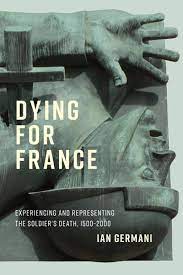Search Results: Returned 3 Results, Displaying Titles 1 - 3
-
-
2023., McGill-Queen's University Press Call No: NEW QWF 355.009 G373d Availability:1 of 1 At Your Library Series Title: McGill-Queen's studies in the history of ideas Volume: 87.Summary Note: For centuries, the idea of dying honorably for France was extraordinarily potent, reaching its peak during the First World War when 1.4 million French soldiers died in uniform. By the end of the twentieth century, however, public opinion had come to view the soldier's death as an unacceptable tragedy, and also as an essentially private affair. Dying for France seeks to understand that profound shift by considering the soldier's death from the Renaissance to the present. It alights on important episodes in French military history-during the Renaissance and Old Regime, the French Revolution and Napoleonic Wars, the Franco-Prussia War and Paris Commune, the First World War, the Second World War, and the Algerian War-to consider the realities and the representations of military death.
-
-
[2014], McGill-Queen's University Press Call No: QWF 971.03 D826i Availability:1 of 1 At Your Library Series Title: McGill-Queen's studies in the history of ideas Volume: 62.Summary Note: In Idea of Liberty in Canada during the Age of Atlantic Revolutions, 1776-1838, Michel Ducharme shows that Canadian intellectual and political history between the American Revolution and the Upper and Lower Canada rebellions of 1837-38 can be better understood by considering it in relation to the broad framework of revolution in the Atlantic world between 1776 and 1838. Inspired by intellectual histories of the Atlantic world, Ducharme goes beyond the scholarly focus on Atlantic republicanism to present the rebellions of 1837-38 as a confrontation between two very different concepts of liberty. He uses these concepts as lenses through which to read colonial ideological conflict. Ducharme traces political discourse in both colonies, showing how the differing fates and influence of republican and constitutional notions of liberty affected state development. He also pursues a number of important revisionist historical claims, including the idea that nationalist politics were not at issue in the period and that "responsible government" was never a Patriote party platform or interest. Taking a wider view allows Ducharme to provide a solid understanding of the ideological substance of political conflict and shows that, starting in 1791, Canadian colonial political culture revolved around an ideal of liberty that differed from the liberty at work within the revolutionary movements of the late eighteenth century but was nonetheless born of the Enlightenment.
-
-
c2013-., McGill-Queen's University Press Call No: QWF 320.5 L234s Availability:1 of 1 At Your Library Series Title: McGill-Queen's studies in the history of ideas Volume: 58.Summary Note: In The Social History of Ideas in Quebec, 1760-1896, Yvan Lamonde traces the province's political and intellectual development from the British Conquest to the election of Prime Minister Wilfrid Laurier. From the individuals who formulated them, to the networks in which they circulated, to their reception, Yvan Lamonde focuses on ideas at work and their role in shaping Quebec history. The mapping of a complete intellectual circuit allows Lamonde to follow the strains of ideological debates - monarchism, liberalism, republicanism, democracy, revolution, ultramontanism, nationalism - over more than a century. His work is informed by an encyclopaedic reading of the print culture of the period and the book conveys a profound and nuanced knowledge of the social context and cultural channels - educational institutions, newspapers, the book trade - in which intellectual debate occurred. Lamonde argues that while these ideas concerned politics, they went beyond the political: they were a fundamental and everyday element of civic society that was expressed in the public sphere through pamphlets, the popular press, and sermons. Lamonde's scrutiny of public opinion in Quebec allows him to place such currents of thought in the colony's international context: that of France, England, Rome, the United States, and their respective metropolises. The Social History of Ideas in Quebec, 1760-1896 covers a volatile time in the province's history - from the end of the French Regime through the American invasion, the War of 1812, and the Rebellions in Lower Canada - capturing the cultural ascension of a society and the foundations of Quebec identity.







